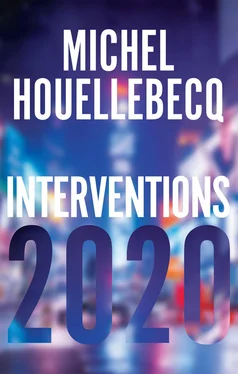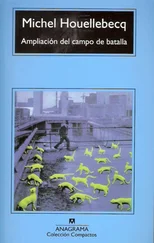J-YJ and CD: It could also include scientific diagrams.
MH: Yes that would be perfect. You should be able to put everything in it. Novalis, and the German romantics in general, aimed to achieve total knowledge. It was a mistake to give up on this ambition. We wriggle about like swatted flies; and yet we have a vocation for total knowledge.
J-YJ and CD: Obviously, as it happens, all of your writing is filled with a terrible pessimism. Could you give two or three reasons that you think may help stave off suicide?
MH: Kant clearly condemned suicide in 1785 in his Groundwork of the Metaphysics of Morals . Let me quote him: ‘To annihilate the subject of morality in one’s own person is to drive out morality from the world, insofar as that world depends on oneself.’ 2The argument seems naive and almost pathetic in its innocence, as often with Kant; I believe, however, that it’s the only argument. It’s only a sense of duty that can really keep us alive. Concretely, if you wish to endow yourself with a practical duty, you must make sure that the happiness of another being depends on your existence; you can for example try to raise a young child, or failing that, buy a poodle.
J-YJ and CD: Can you tell us about the sociological theory according to which the fight for social success specific to capitalism comes with a more treacherous and brutal struggle, this time sexual in nature?
MH: It’s very simple. Animal and human societies set up different systems of hierarchical differentiation, which can be based on birth (the aristocratic system), wealth, beauty, physical strength, intelligence, talent, and so on. Actually, all these systems seem to me to be almost equally contemptible; I reject them; the only superiority I recognize is kindness. Currently, we move about in a two-dimensional system: erotic attractiveness and money. The rest, people’s happiness and unhappiness, flows from these. In my view, this is by no means a theory; we do live in a simple society, which these few sentences describe completely.
J-YJ and CD: One of the most violent scenes in the novel is set in a nightclub on the Vendée coast. There are abortive scenes of seduction, flabby bellies that cause resentment and bitterness, purely sexual encounters. However, this place appears in your texts as the equivalent of the supermarket. Are people consumers in both places in the same way?
MH: No. A parallel could be drawn between special offers on chicken on the one hand, and miniskirts on the other; but the analogy ends there – with the enhancement of the supply. The supermarket is a true modern paradise; struggle ends at its threshold. The poor, for example, don’t go inside. People have made their money elsewhere; now they’re going to spend it, in the presence of an innovative and varied supply, often reliable in terms of taste and well documented from a nutritional point of view. Nightclubs present a very different picture. Many frustrated people continue – against all hope – to frequent them. They thus have the opportunity to verify, minute after minute, their own humiliation; here, we are much closer to hell. That being said, there are sex supermarkets, which produce a fairly comprehensive catalogue of porn on offer; but they lack the essential. For most people, the goal of the sexual quest is not pleasure, but narcissistic gratification, the homage paid by desirable partners to one’s own erotic excellence. That’s why AIDS hasn’t brought about much of a change; condoms diminish the pleasure, but the desired goal is not, unlike in the case of food products, pleasure: it’s the narcissistic intoxication of conquest. Not only do consumers of porn not experience this intoxication, they often feel the opposite. Finally, we can add, for the sake of completeness, that some people who embody deviant values continue to see a connection between sexuality and love.
J-YJ and CD: Can you tell us about that computer engineer, the one you call ‘the network man’? What does this type of character refer to in our contemporary reality?
MH: We must realize that the manufactured objects of the world – reinforced concrete, electric lights, metro trains, handkerchiefs – are currently designed and manufactured by a small class of engineers and technicians, capable of imagining, then deploying the appropriate equipment; they alone are really productive. They represent maybe five per cent of the workforce – and that percentage is steadily declining. Other company staff – salespeople, advertisers, office workers, administrative executives, designers – have a much less obvious social utility; they could disappear without really affecting the production process. Their apparent role is to produce and manipulate different classes of information, that is to say different copies of a reality that escapes their understanding. It’s in this context that we can situate the current explosion of networks of information transmission. A handful of technicians – at most five thousand people in France – are in charge of defining the protocols and producing the equipment that will allow, in the coming decades, the instantaneous worldwide transport of any category of information – text, sound, image, possibly tactile and electrochemical stimuli. Among them, some are creating a positive discourse on their own practice, according to which the human being, conceived as a centre for producing and transforming information, will find his or her full dimension only through interconnection with a maximum of similar centres. Most, however, do not produce any discourse; they just do their job. They thus fully realize the ideal of the technician, which has guided the historical movement of Western societies since the end of the Middle Ages, and which can be summed up in one sentence: ‘If it’s technically doable, it will be technically done.’
J-YJ and CD: Your story can be given an initial psychological reading, but it’s its sociological character that creates the most lasting impression. Could this be a work of less literary than scientific ambition?
MH: Maybe, but that might be going too far. As a teenager, I was indeed fascinated by science – in particular by new concepts developed in quantum mechanics; but I haven’t really addressed these questions in my writing yet; the real conditions for surviving in the world have undoubtedly occupied me too much. I am still a little surprised when I am told that I create successful psychological portraits of individuals, of characters: this may be true, but on the other hand I often have the impression that the individuals are almost identical, that what they call their self doesn’t really exist, and that it would in a sense be easier to define a historical movement. Perhaps we here have the beginnings of a complementarity à la Niels Bohr: wave and particle, position and velocity, individual and history. On a more literary level, I strongly feel the need for two complementary approaches: the affective and the clinical. On the one hand, dissection, cold analysis, humour; on the other, emotional and lyrical participation, where the lyricism is immediate.
J-YJ and CD: Despite the choice of the novel as a genre, you seem to think naturally in terms of poetry.
MH: Poetry is the most natural way to translate the pure intuition of an instant. There really is a core of pure intuition, which can be directly translated into pictures, or words. As long as we remain in poetry, we also remain in truth. Then the problems begin: when it comes to organizing these fragments, establishing a continuity that is both meaningful and musical. There, the experience of montage probably helped me a lot.
J-YJ and CD: Yes – before you started writing, you made some short films. What were your influences? And what’s the connection between these images and your literature?
Читать дальше







